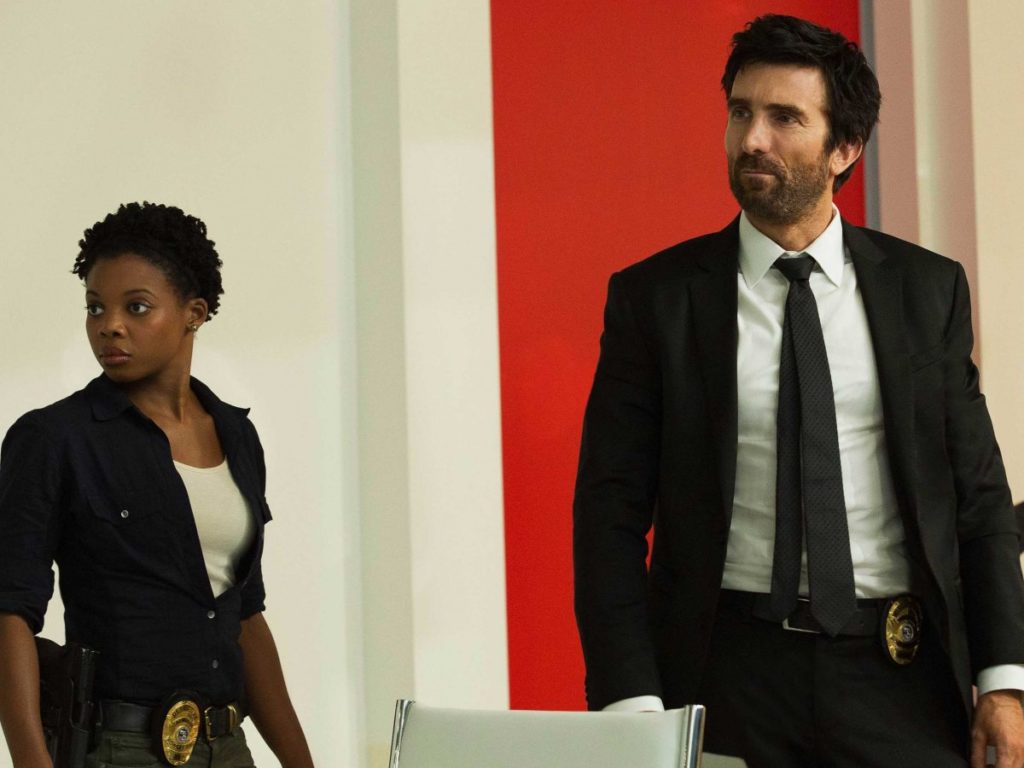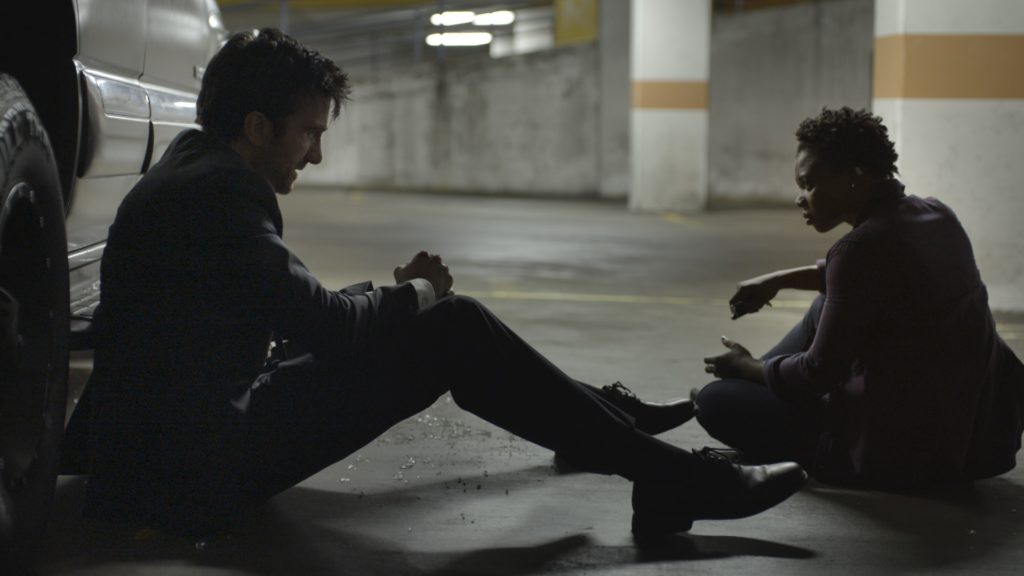In the second episode of Powers, a character is playing Sony’s superhero exclusive Infamous: Second Son, with Delsin Rowe reskinned to look like a superhero from the show. The kid is wearing fancy Sony headphones and makes use of the PS4’s face camera, in a way that screams “blatant marketing” in giant blue letters. It’s an odd moment that highlights how odd it is that Powers got chosen for a live action series instead of Infamous, a PlayStation exclusive franchise that was even the selling point for buying a PS4. People know of the characters from the Infamous universe, and with Second Son taking place years after Infamous 2, this would’ve been a moment to show what happened over the seven-year gap. Instead, here’s…well, let’s get into what Powers is.
Powers is a thankfully an easy show to summarize. It’s an adaptation of the long running comic of the same name from Brian Michael Bendis and Michael Avon Oeming, set in Los Angeles where cops operate in the world of superheroes. Our hero is Sharlto Copley’s Christian Walker, former hero Diamond who lost his powers and became a cop. His partner is killed by a Power and is replaced by Deena Pilgram, played by Susan Heyward. The two investigate the death of a Power and a young woman (Olesya Rulin) linked to his death. Also mixed into this is Noah Taylor’s Johnny Royale, a Power with the ability to teleport and looks like Gary Oldman while sounding like Christian Bale’s Batman.
If nothing else, Powers feels like a comic book in that it handles exposition with the grace of a drunk person on the dance floor. The world building is inconsistent; the way the cops deals with each Power according to their abilities and weaknesses is interesting, as is the idea of Power kids who walk around fully aware of their powers and status. What doesn’t work is that the show seems to think the viewer has the memory of a goldfish and forgets that Christian lost his powers. They reiterate the fact something like five times in the pilot, either at the start via info dump from Extra’s Mario Lopez, and later on when Christian screams that his nemesis Wolfe (Eddie Izzard in a frankly ridiculous wig) “took my powers!”, something that was all but explicitly stated about 10 minutes earlier.
The tone also feels like something that will become more of a problem as the show goes on. While it embraces Flash’s costumed characters and cheesy one liners–one character literally shouts “ride the lightning” before shooting electricity out of his eyes–it also relies a bit too much on Gotham’s attempts to be gritty. This is a world where people in ridiculous looking costumes are casually enjoying a hot dog in the middle of the park and cops are growling out “shits” and “fucks” every two minutes like their hearts will stop if they don’t. At times, it can be poignant, such as Christian begging Rulin’s Calista to not jump off a roof to find out if she has powers because, as he puts it, she’s “special anyway”. Other times, it’s just weird. There’s a moment where Christian and Deena are talking with the wife of their murder victim and she just goes on about her and her husband having superpowered orgies back in the day while the music swells. It’s just a weird moment that feels like it belongs in a comedy instead of a gritty crime drama.
Also not helping is a cast that’s all over the place. Copley works best when he’s playing the tortured ex-hero, because it’s the only time that he actually feels genuine. Outside of those moments, he just feels like he’s overdoing the grit and his American accent is distracting to the point where even his heartfelt moments lose some of their impact. But that’s nothing compared to Taylor’s, which fluctuates with every other line. In episode one in particular, it felt like he wasn’t entirely sure what to stick with. Rulin’s Calista alternates between being endearing and annoying. Part of it is how she’s written; she’s a “wannabe” who wants powers of her own and to just be accepted by her idol Retro Girl, but she continues to ally herself with Royale despite how blatant he couldn’t be telegraphing his plans to kill her once she’s outlived her usefulness.
Of the main cast, Heyward and Michelle Forbes’ Retro Girl are the most consistent in acting. Heyward gets some good comebacks, despite the show’s apparent attempt to shit on her, and she carries herself well as a normal in a world of Powers. Forbes’ plays Retro Girl with the right amount of smugness to her actions; she knows she’s a diva and an idol to normal people and fully embraces it. Her walking into a nightclub and pushing down a fan who’s a little too touchy feels realistic and appropriate. The show works best when it has these superhuman characters going through very human moments, like Christian watching two Powers fight in the sky and contemplating jumping off his roof to see if he can fly again.
PlayStation has decided to launch Powers with a trio of episodes that are inconsistent in terms of quality. The premiere episode is definitely the weakest, alternating between goofy overdoses of grit and human levels of poignancy, while the next two pick up speed and become more interesting. It’s in episode three in particular where it feels like the series could become something bigger. A subplot about neutralizing imprisoned Powers leads to Eddie Izzard’s Wolfe finally getting something to do besides be chained and naked. It’ll be interesting to see where things go from here, but I wouldn’t blame anyone who decided to tune out after the first episode. Those who do stick with it weekly may find the show to get better, but for now, this superhero show needs some extra training.


